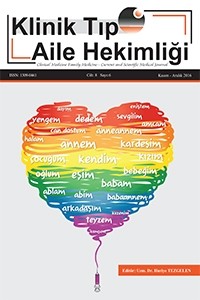Subakromiyal Sıkışma Sendromu Tedavisinde İki Farklı Steroid Enjeksiyonunun Etkinliğinin Değerlendirilmesi
Omuz impingement sendromu, steroid enjeksiyonu, ağrı
Evaluation of The Effectiveness of Two Different Steroid Injections In Treatment of Subacromial Impingement Syndrome
Shoulder impingement synro-me, steroid injection, pain,
___
- Kaynaklar 1.Dogu B, Yucel SD, Sag SY, Bankaoglu M, Kuran B. Blind orultrasound-guided corticosteroid injections and short-term res-ponse in subacromial impingement syndrome: a randomized,double-blind, prospective study. Am J Phys Med Rehabil. 2012Aug;91(8):658-65. doi: 10.1097/PHM.0b013e318255978a. 2.Ucuncu F, Capkin E, Karkucak M, et al: A comparison of theeffectiveness of landmark-guided injections and ultrasongraphyguided injections for shoulder pain. Clin J Pain 2009;25:786Y9 3.Naredo E, Cabero F, Beneyto P, et al: A randomized compa-rative study of short term response to blind injection versussonographic-guided injection of local corticosteroids in pa-tients with painful shoulder. J Rheumatol 2004;31:308Y14 4.Penning LIF, de Bie RA, Walenkamp GHIM: The effectivenessof injections of hyaluronic acid or corticosteroid in patientswith subacromial impingement: a three-arm randomisedcontrolled trial. J Bone Joint Surg 2012, 94-B(9):1246–1252.British Volume. 5.Wittich CM, Ficalora RD, Mason TG, et al. Musculoskeletalinjection. Mayo Clin Proc 2009;84:831–7. 6.Choi WD, Cho DH, Hong YH, et al. Effects of subacromialbursa injection with corticosteroid and hyaluronidase accor-ding to dosage. Ann Rehabil Med 2013;37:668–74. 7.Withrington RH, Girgis FL, Seifert MH. A placebo-control-led trial of steroid injections in the treatment of supraspina-tus tendonitis. Scand J Rheumatol 1985;14:76-8. 8.Alvarez CM, Litchfield R, Jackowski D, Griffin S, Kirkley A.A prospective, double-blind, randomized clinical trial com-paring subacromial injection of betamethasone and xylocai-ne to xylocaine alone in chronic rotator cuff tendinosis. AmJ Sports Med 2005; 33:255-62. 9.Adebajo AO, Nash P, Hazleman BL. A prospective double blinddummy placebo controlled study comparing triamcinolone he-xacetonide injection with oral diclofenac 50 mg TDS in pa-tients with rotator cuff tendinitis. J Rheum 1990;17:1207-10 10.Celik D, Atalar AC, Guclu AC, et al: The contributio of su-bacromial injection to the conservative treatment of impinge-ment syndrome. Acta Orthop Traumatol Turc 2009;43:331Y5 11.Beggs I: Ultrasound of the shoulder and elbow. Orthop ClinNorth Am 2006;37:277Y85 12.Louis LJ: Musculoskeletal ultrasound intervention: princip-les and advances. Radiol Clin North Am 2008;46:515Y33 13.Bloom JE1, Rischin A, Johnston RV, Buchbinder R. Image-guided versus blind glucocorticoid injection for shoulder pain.Cochrane Database Syst Rev. 2012 Aug 15;(8):CD009147. doi:10.1002/14651858.CD009147.pub2. 14.Henkus HE, Cobben LP, Coerkamp EG, et al: The accuracyof subacromial injections: a prospective randomized magne-tic resonance imaging study. Arthroscopy 2006;22:277Y82 15.Esenyel CZ, Esenyel M, Yes¸iltepe R, et al: Subakromial sı-kısma sendromunda steroid enjeksiyonunun doğru şekilde uy-gulanması ile omuz ağrısı ve fonksiyonu arasındaki ilis¸ki. ActaOrthop Traumatol Turc 2003;37:41Y5 16.Kang MN, Rizio LR, Prybicien M, et al: The accuracy of su-bacromial corticosteroid injections: a comparison of multip-le methods. J Shoulder Elbow Surg 2008;61Y6 17.Buchbinder R, Green S, Youd JM: Corticosteroid injectionsfor shoulder pain. Cochrane Database Syst Rev 2003,1:CD004016. 18.Wittich CM, Ficalora RD, Mason TG, et al. Musculoskeletalinjection. Mayo Clin Proc 2009;84:831–7.
- ISSN: 1309-0461
- Başlangıç: 2009
- Yayıncı: Selen Medya Yayıncılık Tanıtım ve Organizasyon Hizmetleri
Palyatif Hasta Yakınlarının GündüzlüHasta Bakımına Bakış Açısı
Aile Hekimliğinde Defin Hizmetlerine Bakış
Postpartum Dönemde Görülen Akut Pankreatit Vakası
Birinci Basamak Sağlık Merkezine Başvuranların Sağlık Turizimine Bakış Açıları
İlk Basamakta Uygulanabilecek Önemli Bir Tarama Yöntemi; Kırmızı Refle Testi
Modifiye Edilmiş Trikrom BoyamaMetodu ve Wheatley'in Trikrom Boyama Metodunun Karşılaştırılması
